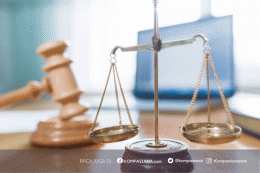One aspect of teaching law is about the sources of law. the source of law is how and where the place or origin of legal regulations is taken or used as a guide to the life of a country. According to E.Utrecht, there are two kinds of understanding of legal sources of legal sources in a formal sense and legal sources in a substantial, material sense. The source of law in the formal sense is the formal place in written form from which a legal method is taken, while the source of law in the material sense is the place where the norm comes from, either in written or unwritten form.
a. Source of Law in Formil Sense
The source of constitutional law in the formal sense is all written and unwritten legal regulations. The source of formal law is the place or source from which a regulation obtains legal force. Related to the form or method that causes formal legal regulations to apply. there are seven formal sources of Constitutional Law in indonesia as follows :
1. Constitution
According to Jimly Asshiddiqie, the constitution is the basic law, basic norms, and at the same time the highest position in the state system, divided into two, namely the constitution in the sense of written and unwritten constitution. The written constitution is the 1945 Constitution of the Republic of Indonesia, while the unwritten constitution is the constitution in a broad sense, which lives in legal consciousness and the idealized practice of state administration.
2. International Treaties
Treaties or agreements are one of the sources of formal law. Many terms are used in international agreements such as charter, covenant, pact, statute, convention, act, protovol and et cetera. International treaties can be bilateral, if held by two countries, multiteral, if held by many countries, collective, if a multilateral treaty provides an opportunity for countries that initially did not participate in holding it, then become parties to the treaty. According to Utrecht, the making of a treaty goes through four consecutive phases, namely: a) Determination; b) Approval; c) Ratification; d) Inauguration or announcement.
3. Jurisprudence
In the Indonesian legal system, not all court decisions can become or be considered jurisprudence, court decisions considered as jurisprudence must fulfill the following conditions: (1) it must be a decision that has permanent legal force; (2) it is considered good in the sense that it does produce justice for the parties concerned; (3) decisions that are repeated several times or carried out in the same pattern in several separate places; (4) the norms contained therein are indeed no applicable written regulations, or even if there are, they are not very clear; (5) the decision is considered to have met the requirements of jurisprudence and is recommended by an examination team or self-assessment team formed by the Supreme Court or Constitutional Court to become permanent jurisprudence.
Jurisprudence can be divided into two classifications, namely: First, jurisprudence (ordinary) where all court decisions that have been "inkracht van gewijsde", that is, have permanent legal force. Second, permanent jurisprudence (vaste jurisprudentie) is a judge's decision that is always followed by other judges in similar cases that take place continuously.
4. Doctrine







